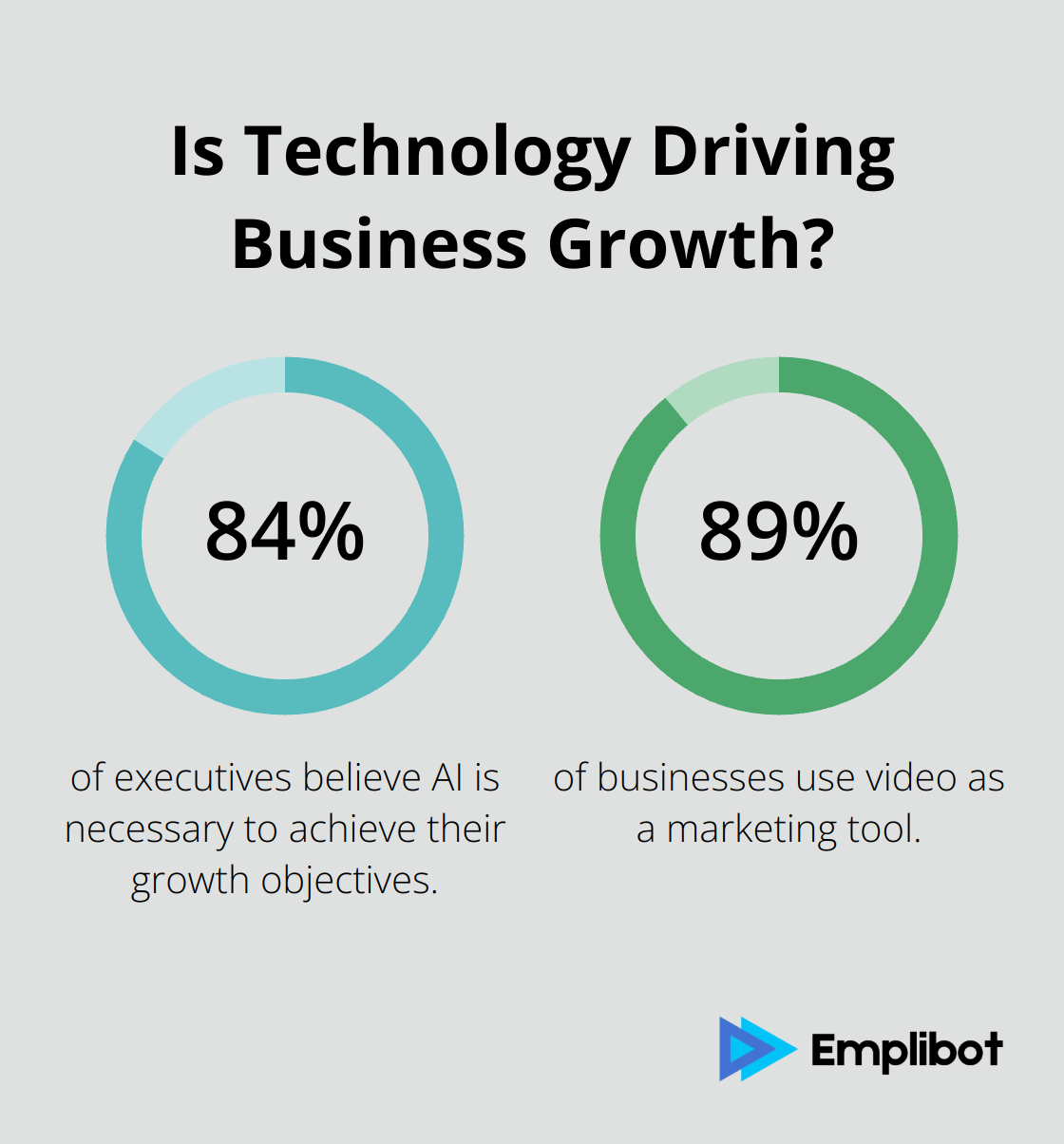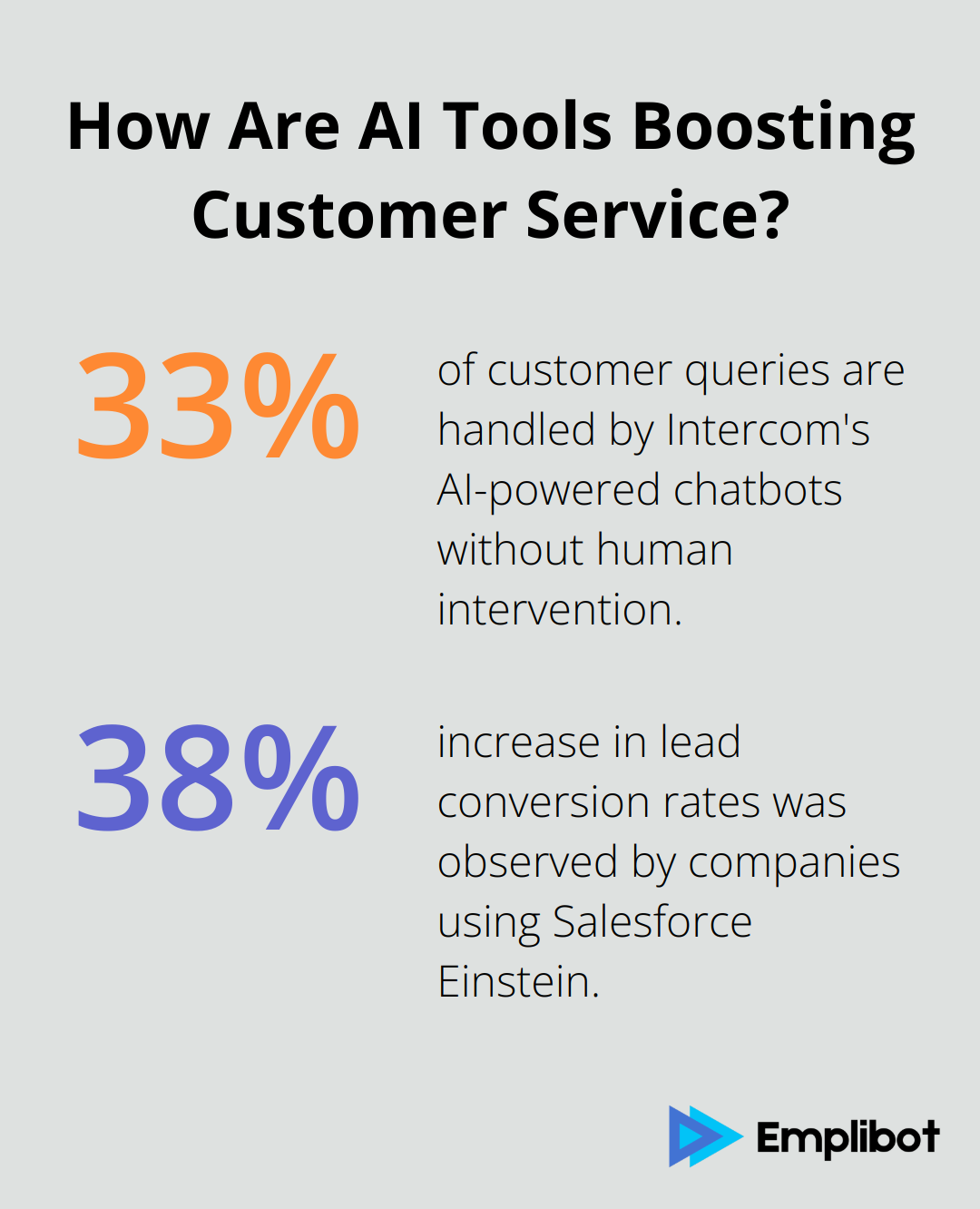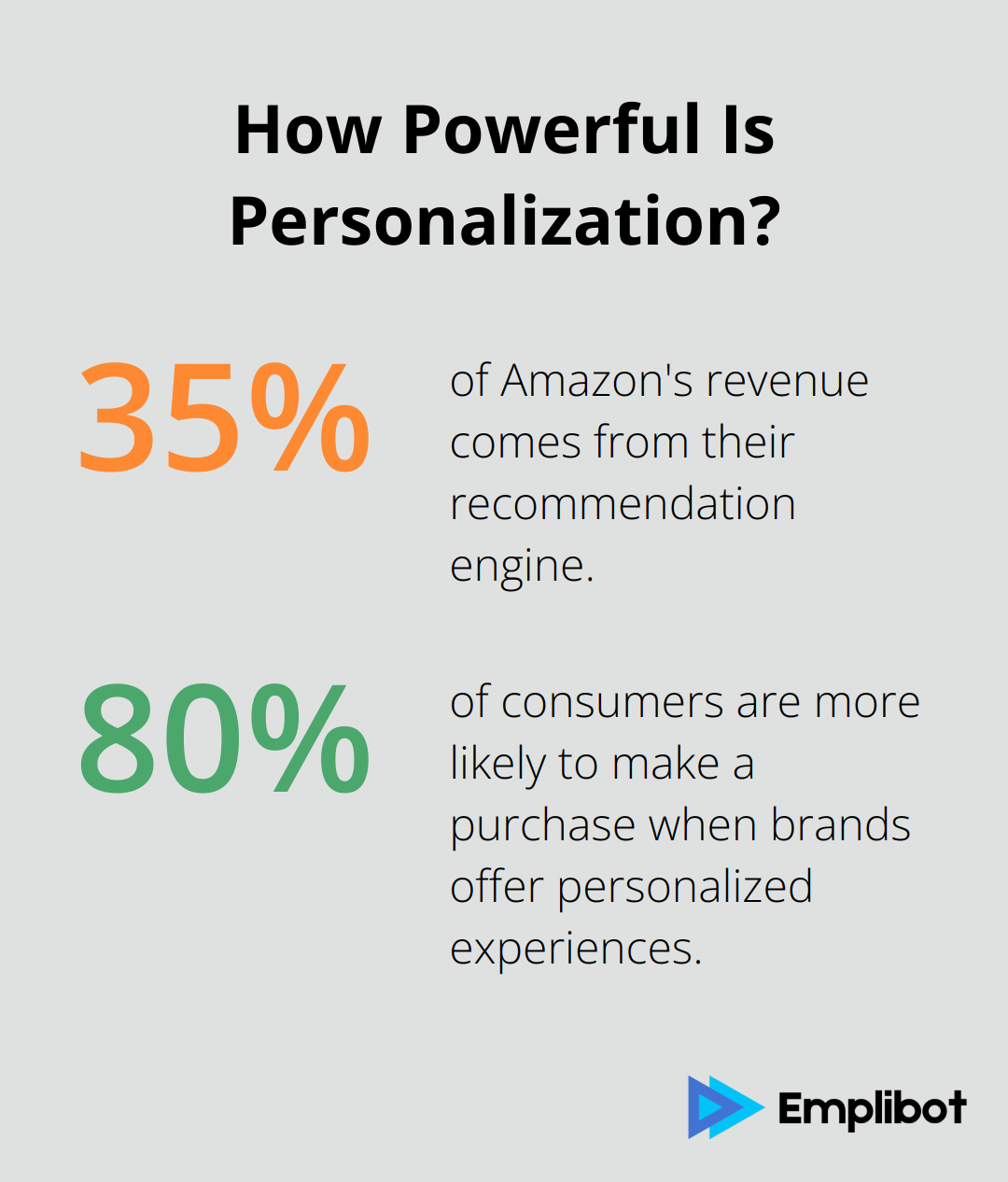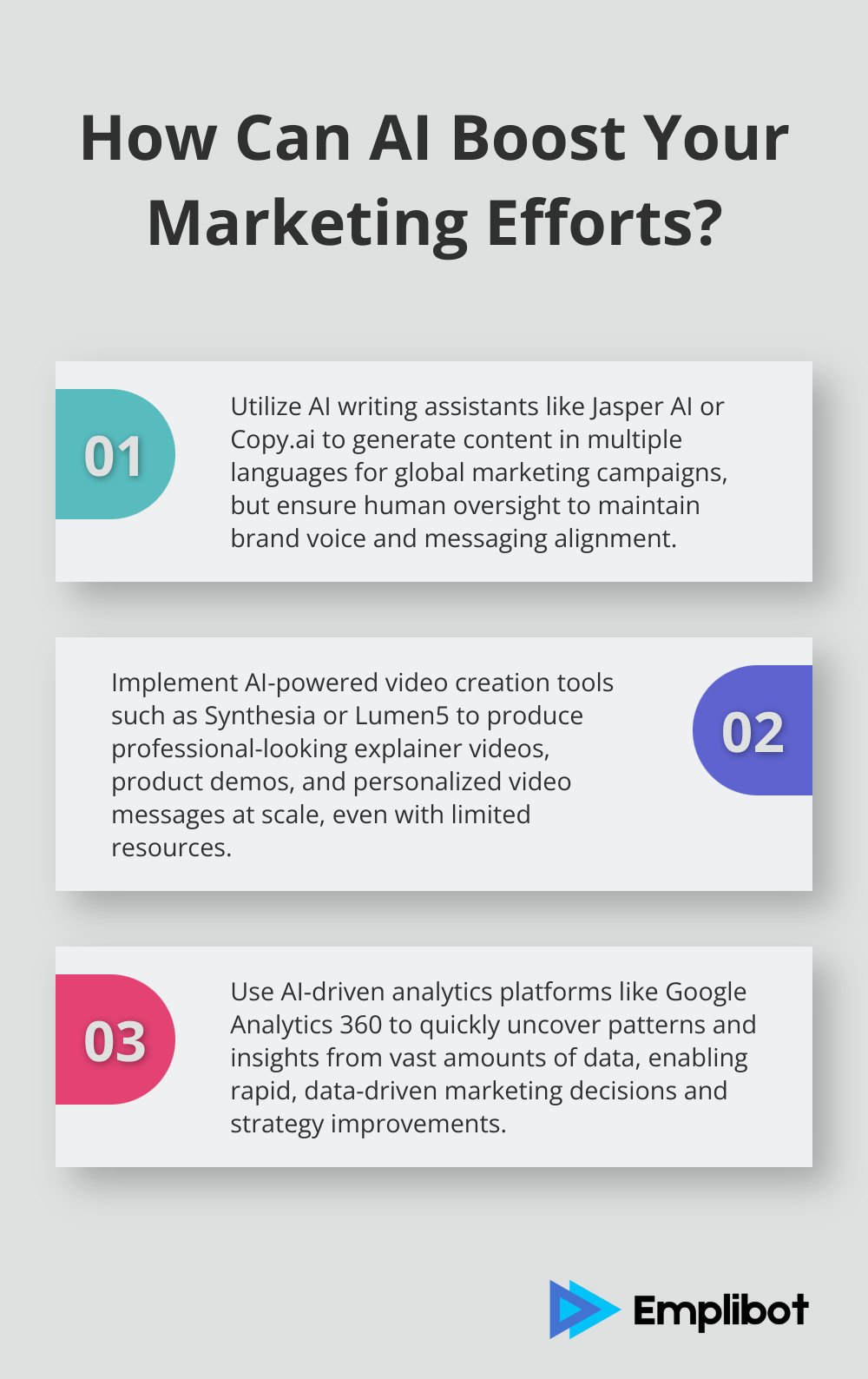At Emplibot, we’ve seen firsthand how AI is revolutionizing marketing strategies.
Top AI tools for marketing are transforming how businesses create content, analyze data, and personalize customer experiences. These powerful technologies offer unprecedented opportunities for marketers to boost efficiency and drive results.
In this post, we’ll explore the most effective AI tools and show you how to leverage them for marketing success.
AI Content Creation Tools That Transform Marketing
AI Writing Assistants: Your Content Powerhouse
AI writing assistants have become essential for marketers who want to produce high-quality content at scale. Tools like Jasper AI and Copy.ai lead the industry, offering features that generate blog posts, social media updates, and ad copy in minutes.

Jasper AI, for instance, creates content in over 25 languages, making it ideal for global marketing campaigns. A study by Accenture reveals that 84% of executives believe AI is necessary to achieve their growth objectives. This statistic highlights the growing importance of AI writing tools in modern marketing strategies.
When you use these tools, maintain your brand voice. AI generates content quickly, but human oversight ensures the output aligns with your brand’s tone and messaging.
Visual Content Creation with AI
Visual content forms a cornerstone of effective marketing, and AI makes it easier to create stunning images and graphics. Platforms like DALL-E 2 and Midjourney push the boundaries of AI-generated visuals.
Midjourney has gained popularity for its ability to create highly detailed, artistic images from text prompts. Marketers use this tool to generate unique visuals for social media posts, blog headers, and even product mockups.
Use these tools responsibly. Always ensure you have the right to use AI-generated images in your marketing materials and be transparent about their origin when necessary.
AI Video Creation: Engaging Audiences at Scale
Video content dominates social media and marketing strategies, and AI makes video creation more accessible. Tools like Synthesia and Lumen5 lead in AI-powered video creation.
Synthesia allows marketers to create professional-looking videos with AI-generated avatars and voiceovers. This tool proves particularly useful for creating explainer videos, product demos, and personalized video messages at scale.
A report by Wyzowl shows that 89% of businesses use video as a marketing tool. With AI video creation tools, even small businesses can produce high-quality video content without expensive equipment or extensive technical skills.
The Human Touch in AI-Powered Marketing
While AI tools offer incredible capabilities, they should enhance, not replace, human creativity. The most successful marketing strategies blend AI efficiency with human insight and emotional intelligence.
As we move forward, it’s clear that AI will continue to play a significant role in content creation. However, the true power lies in combining these tools with data-driven insights. In the next section, we’ll explore how AI transforms data analysis and customer insights, providing marketers with unprecedented understanding of their audience.
How AI Revolutionizes Data Analysis for Marketing Success
AI-Driven Analytics Platforms: Uncovering Hidden Insights
AI-driven analytics platforms transform how marketers interpret data. These tools can sift through vast amounts of information in a fraction of the time it would take humans, uncovering patterns and insights rapidly.

Google’s Analytics 360 suite uses machine learning to automatically surface critical insights about your audience and their behavior. This allows marketers to make data-driven decisions quickly and efficiently.
A study found that AI has vast potential in marketing, aiding in proliferating information and data sources, improving software’s data management capabilities, and designing more effective strategies.
AI Chatbots: 24/7 Customer Service and Data Collection
AI chatbots have become indispensable for customer service and data collection. These tireless digital assistants engage with customers round the clock, answering queries and gathering valuable data.
Intercom (a leader in chatbot technology) reports that their AI-powered chatbots handle up to 33% of customer queries without human intervention. This not only improves response times but also frees up human agents to handle more complex issues.
Moreover, chatbots are goldmines of customer data. They collect information on customer preferences, pain points, and behavior patterns. This data proves invaluable for refining marketing strategies and improving products or services.
Predictive Analytics: Forecasting Customer Behavior
AI’s predictive capabilities are perhaps its most exciting feature for marketers. By analyzing historical data and current trends, AI forecasts customer behavior with remarkable accuracy.
Salesforce Einstein uses AI to predict which leads are most likely to convert, allowing sales teams to prioritize their efforts effectively. According to Salesforce, companies using Einstein have seen an average 38% increase in lead conversion rates.
Similarly, AI predicts which customers are at risk of churning, allowing marketers to implement retention strategies proactively. A study by Bain & Company found that increasing customer retention rates by just 5% can increase profits by 25% to 95%.
AI’s ability to analyze data and provide actionable insights transforms marketing from a guessing game into a science. As we harness these powerful tools, we see even more innovative applications in personalization and targeting. In the next section, we’ll explore how AI revolutionizes these crucial aspects of marketing (and why they matter for your bottom line).
How AI Personalizes Your Marketing
Dynamic Content Personalization
AI algorithms transform website content in real-time based on user behavior, preferences, and demographics. Amazon’s recommendation engine (which accounts for 35% of their revenue) analyzes browsing history, purchase patterns, and similar user profiles to suggest products.

To implement dynamic content personalization:
- Collect and centralize your customer data
- Use AI-powered tools like Dynamic Yield or Optimizely
- Create personalized experiences across your digital touchpoints
- Test different content variations
- Automatically serve the most effective version to each user segment
AI-Powered Ad Targeting
AI makes ad targeting more precise and cost-effective. Facebook and Google use machine learning algorithms to optimize ad delivery based on user behavior and conversion likelihood.
To leverage AI for ad targeting:
- Create detailed audience segments using first-party data
- Use tools like Albert.ai or Adext AI to automate your ad campaigns across multiple channels
- Continuously optimize your ad spend, targeting, and creative elements to maximize ROI
A study found that AI-powered ad tech could increase ad relevance, engagement, and ultimately, conversion rates, leading to improved return on ad spend (ROAS).
Email Marketing Automation and Personalization
AI takes email marketing to new heights, enabling hyper-personalized campaigns that adapt to individual subscriber behaviors. Tools like Mailchimp and Klaviyo use AI to segment audiences, predict the best send times, and even generate subject lines that are more likely to be opened.
To enhance your email marketing with AI:
- Implement behavior-based triggers
- Set up automated emails for specific customer actions (e.g., cart abandonment or multiple product views)
- Use AI-powered tools to optimize your email content and send times
An Epsilon research indicates 80% of consumers are more likely to make a purchase when brands offer personalized experiences.
Balancing AI and Privacy
AI offers powerful capabilities for personalization and targeting, but it’s important to maintain transparency and respect user privacy. Always be clear about how you use customer data and provide options for users to control their data preferences.
The Future of AI in Marketing
As we explore AI’s potential in marketing, it’s clear that personalization and targeting will play an increasingly important role. Marketers who effectively harness these AI-powered tools will gain a significant competitive advantage in delivering tailored, relevant experiences to their customers.
Final Thoughts
Top AI tools for marketing revolutionize the industry, offering unparalleled opportunities for efficiency, personalization, and data-driven decision-making. These tools reshape how marketers connect with their audiences, but human creativity and strategic thinking remain essential. AI serves as a powerful assistant, not a replacement for the human touch that infuses campaigns with emotion, authenticity, and brand personality.

The future of AI in marketing brims with potential, and we expect even more sophisticated applications to emerge. Marketers must stay informed and adaptable, continuously learning and experimenting with new AI tools and techniques. Those who thrive will embrace AI as a powerful ally, using it to enhance creativity, streamline processes, and deliver more value to customers.
At Emplibot, we understand the transformative power of AI in marketing. Our automated content marketing solution harnesses AI to streamline your WordPress blog and social media efforts. Businesses can boost their online presence and drive results while saving valuable time and resources (all through the power of AI).

